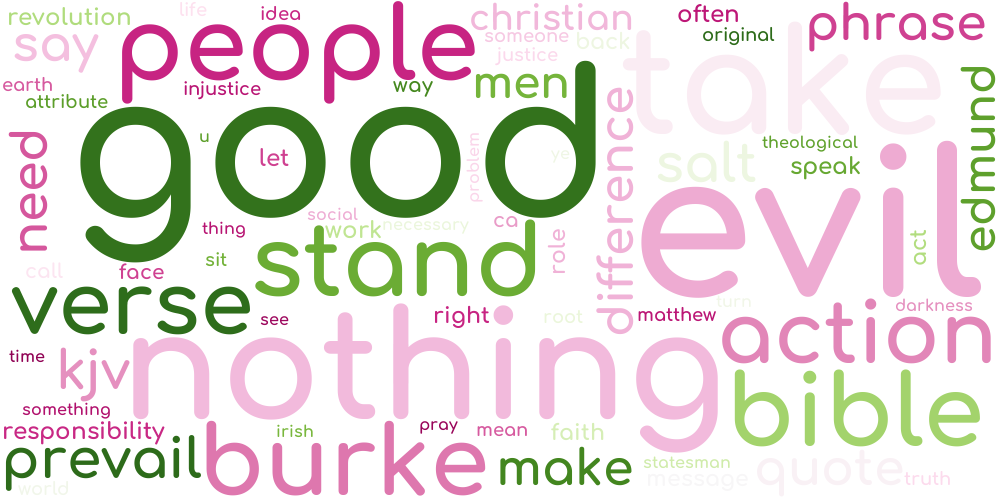Key Takeaways
- The phrase “evil prevails when the good do nothing” is not a direct quote from the Bible, but it is a paraphrase of a concept found in several passages.
- The idea is that when good people fail to act or speak out against evil, it can lead to the triumph of evil.
- A similar concept is found in the book of Isaiah, where it says, “For the LORD has spoken: ‘I have raised him up in righteousness, and I will direct all his ways. He will not falter or be discouraged till he establishes justice on earth. In his teaching the islands will put their hope'” (Isaiah 42:4, 6-7).
- Another relevant passage is found in the book of Ezekiel, where God says, “I looked for someone among them who would build up the wall and stand before me in the gap on behalf of the land so I would not have to destroy it, but I found no one” (Ezekiel 22:30).
- The apostle Paul also writes about the importance of standing against evil in his letter to the Ephesians, saying, “For our struggle is not against flesh and blood, but against the rulers, against the authorities, against the powers of this dark world and against the spiritual forces of evil in the heavenly realms” (Ephesians 6:12).
- The concept of standing against evil is also found in the book of Proverbs, which says, “Rescue those being led away to death; hold back those staggering toward slaughter” (Proverbs 24:11).
- The idea that “evil prevails when the good do nothing” is also echoed in the writings of Edmund Burke, an 18th-century Irish philosopher, who said, “The only thing necessary for the triumph of evil is for good men to do nothing” Edmund Burke.
Introduction
Background of the Quote
You’ve probably heard the phrase “Evil prevails when good men do nothing” before. It’s a famous quote from Edmund Burke, an Irish statesman from the 18th century. But did you know that this idea is also rooted in the Bible?
| Bible Verse | Message |
|---|---|
| Isaiah 59:14 | Justice is turned back, and righteousness stands afar off; for truth is fallen in the street, and equity cannot enter. |
Importance of the Message
So, why is this message so important? It’s because we, as Christians, have a responsibility to stand up for what’s right. We can’t just sit back and watch as evil takes over. We’ve got to take action, even if it’s scary or uncomfortable.
“Ye are the salt of the earth: but if the salt have lost his savour, wherewith shall it be salted? it is thenceforth good for nothing, but to be cast out, and to be trodden under foot of men.” (Matthew 5:13, KJV)
We’ve got to be the salt of the earth, preserving what’s good and standing up for justice. If we don’t, who will?
Now, check out this word cloud for a glimpse of the key themes.
Word cloud by BibleBreathe.com about evil prevails when the good do nothing bible verse
Meaning of the Quote
Photo modified by BibleBreathe.com. Original photo by Egor Kamelev on Pexels
Interpretation of the Quote
Have you ever heard the phrase “Evil prevails when good men do nothing“? It’s a pretty powerful statement, and it’s actually rooted in the Bible.
The quote is often attributed to Edmund Burke, but the idea behind it is found in Proverbs 24:23-25, which says, “These things also belong to the wise. It is not good to have respect of persons in judgment. He that saith unto the wicked, Thou art righteous; him shall the people curse, nations shall abhor him: But to them that rebuke him shall be delight, and a good blessing shall come upon them.” (KJV)
So, what does it mean? Simply put, when good people choose to do nothing, evil can take over. It’s like a vacuum – if we don’t fill the space with good, something else will fill it, and that something else is often evil.
The Role of Evil and Good
Let’s break it down further.
| Role | Description |
|---|---|
| Evil | Evil is like a weed – it’ll grow and spread if we don’t stop it. It’s the opposite of good, and it seeks to destroy and harm. |
The problem is, evil often prevails because good people are either afraid to act or don’t think their actions will make a difference. But the truth is, every small action counts, and together, we can make a big impact.
As Ephesians 5:11 says, “And have no fellowship with the unfruitful works of darkness, but rather reprove them.” (KJV) We’re called to stand against evil and to be a voice for good.
So, what can we do? Here are three key things:
- Speak up: When we see evil, we need to speak out against it. This can be as simple as sharing a post on social media or having a conversation with a friend.
- Take action: We can’t just talk about doing good – we need to actually do it. This might mean volunteering, donating to a cause, or simply being there for someone in need.
- Pray: Prayer is a powerful tool in the fight against evil. We can pray for wisdom, courage, and strength to stand against evil and to be a force for good.
Remember, “The only thing necessary for the triumph of evil is for good men to do nothing.” (Edmund Burke) Let’s not be those people.
The Bible Verse
The Original Verse
The phrase “evil prevails when the good do nothing” isn’t actually a direct Bible verse. However, it’s often associated with the Bible and is a pretty common saying. But where did it come from?
| Source | Similar Bible Verse |
|---|---|
| Unofficial origin | Matthew 5:13-16 (ye are the salt of the earth… but if salt have lost his savour, wherewith shall it be salted?) |
As it turns out, the phrase is often attributed to Edmund Burke, an Irish statesman, who said, “When good men do nothing, evil flourishes.” It’s not a direct Bible verse, but it’s a concept that’s rooted in biblical principles.
Comparison of the Two
So, what’s the difference between the original phrase and the Bible verses that convey a similar message? Let’s break it down:
- Bible verses focus on spiritual consequences: Matthew 5:13-16 and Ephesians 5:11 emphasize the importance of living a righteous life and the consequences of not doing so. The original phrase, on the other hand, focuses on the tangible effects of inaction in the face of evil.
- Bible verses emphasize the role of believers: The Bible verses encourage believers to take an active role in spreading the gospel and living a life that reflects God’s values. The original phrase, while not explicitly mentioning believers, implies that it’s the responsibility of “good” people to take action against evil.
While the original phrase isn’t a direct Bible verse, it’s clear that the concept is rooted in biblical principles. As Christians, we’re called to be the salt of the earth and to reprove unfruitful works of darkness. By taking an active role in standing against evil, we can make a tangible difference in the world around us.
Historical Context
Photo modified by BibleBreathe.com. Original photo by Zhu Peng on Pexels
The Time Period of the Quote
The phrase “evil prevails when the good do nothing” is often attributed to Edmund Burke, an Irish statesman and philosopher, who lived from 1729 to 1797. This was a time of great change and upheaval in Europe and America, with the Enlightenment and the French Revolution shaping the way people thought about politics, morality, and faith.
During this period, the concept of moral responsibility was a hot topic. Thinkers like Burke and others were grappling with the idea that individuals had a duty to act in the face of injustice, rather than just standing by and doing nothing.
The Social and Political Climate
The late 18th century was also a time of great social and economic change. The Industrial Revolution was transforming the way people lived and worked, and the American and French Revolutions were redefining the way people thought about government and power.
In this context, Burke’s quote takes on a deeper meaning. He was warning that if good people failed to act, evil would fill the vacuum. This was a call to action, urging people to take a stand against injustice and to work towards creating a more just and equitable society.
| Historical Event | Connection to Burke’s Quote |
|---|---|
| The French Revolution | Burke saw the Revolution as an example of what happens when good people fail to act against evil. |
| The American Revolution | Burke believed that the American Revolution was a more just and moral cause, and that good people had taken a stand against tyranny. |
As Christians, we can learn from Burke’s insight. We are called to be salt and light in a world that often seems dark and corrupt. When we fail to act, evil can prevail. But when we take a stand for what is right, we can make a real difference.
“Ye are the salt of the earth: but if the salt have lost his savour, wherewith shall it be salted? it is thenceforth good for nothing, but to be cast out, and to be trodden under foot of men.” (Matthew 5:13, KJV)
Theological Analysis
Theological Interpretations of the Quote
Let’s dive into the theological meaning behind the quote “evil prevails when the good do nothing.”
This phrase is often attributed to Edmund Burke, an Irish statesman, but it’s rooted in biblical principles.
The Bible says, “And judgment is turned away backward, and justice standeth afar off: for truth is fallen in the street, and equity cannot enter.” (Isaiah 59:14, KJV)
In this verse, we see that when good people do nothing, truth and justice are compromised.
It’s like a silent fire spreading, and if we don’t speak up or take action, it’ll consume everything.
| Key Points | Theological Interpretation |
|---|---|
| Silence in the face of evil | Complicity with evil, whether intentional or not. |
| The role of truth and justice | These values are essential to a just society, and when they’re ignored, evil prevails. |
The Role of Faith and Action
So, what does this mean for us as Christians?
It means we can’t just sit back and expect someone else to take care of the problem.
Faith without works is dead (James 2:26, KJV), and in this case, our inaction can lead to evil prevailing.
We need to combine our faith with action, just like the early Christians who stood up for their faith despite persecution.
And who is he that will harm you, if ye be followers of that which is good?” (1 Peter 3:13, KJV)
Here are three ways we can put our faith into action:
- Speak up against injustice: Use your voice to stand up for what’s right, even if it’s uncomfortable.
- Support organizations fighting evil: Look for groups that are making a difference and support them financially or through volunteering.
- Live out your faith in your daily life: Show the world what it means to be a Christian by living with integrity, compassion, and kindness.
Practical Applications
Photo modified by BibleBreathe.com. Original photo by Jess Bailey Designs on Pexels
How to Apply the Message in Daily Life
Let’s face it, evil prevails when the good do nothing. It’s a harsh reality, but it’s true. As Christians, we’ve got a responsibility to stand up for what’s right, even when it’s hard.
Here are some ways we can apply this message in our daily lives:
- Speak up: When we see injustice or wrongdoing, we’ve got to speak out against it. It might be uncomfortable, but it’s necessary.
- Take action: We can’t just sit back and expect someone else to fix the problem. We’ve got to take action, whether it’s volunteering, donating to a cause, or simply being a listening ear to someone in need.
- Pray: Prayer is powerful, and it’s a great way to start making a difference. We can pray for wisdom, guidance, and courage to stand up for what’s right.
| Situation | How to Apply the Message |
|---|---|
| Seeing bullying at school | Stand up for the person being bullied, or report it to a teacher. |
| Hearing about social injustice | Educate yourself on the issue, and consider getting involved in a local organization that’s working to make a difference. |
Personal Stories and Experiences
I’ll never forget the time I witnessed someone being treated unfairly at work. I was new to the job, and I didn’t know what to do. But then I remembered the verse “Be not deceived: evil communications corrupt good manners” (1 Corinthians 15:33, KJV). I realized that if I didn’t speak up, I’d be contributing to the problem.
So, I took a deep breath and reported the incident to HR. It wasn’t easy, but it was the right thing to do. And you know what? It made a difference. The person who was being treated unfairly got the help they needed, and the workplace became a better place for everyone.
“All that is necessary for the triumph of evil is that good men do nothing.” – Edmund Burke
We’ve all got a choice to make: will we stand up for what’s right, or will we sit back and let evil prevail? The answer is up to us.
Criticisms and Controversies
Opposing Views and Criticisms
Let’s face it – the idea that evil prevails when the good do nothing can be a tough pill to swallow.
Some people might say, “But what about all the good people who are doing something? Why does evil still seem to win?”
Or, “Isn’t this just a cop-out, blaming the good guys for not doing enough?”
These are valid concerns, and we need to address them.
| Criticism | Response |
|---|---|
| “Good people are already doing something” | That’s true, but the Bible says, “The righteous are bold as a lion” (Proverbs 28:1, KJV). We need to be bold and take a stand against evil. |
Counterarguments and Responses
So, what can we say to those who disagree with the idea that evil prevails when the good do nothing?
Here are three key points:
- The Bible is clear: Scripture says, “The wicked shall be turned into hell, and all the nations that forget God” (Psalm 9:17, KJV). We can’t just sit back and do nothing.
- History shows us: Look at examples like the Holocaust or apartheid. When good people did nothing, evil was able to flourish. We can’t let that happen again.
- We have a responsibility: As Christians, we’re called to be the light of the world (Matthew 5:14, KJV). We need to take that responsibility seriously and act.
“All that is necessary for the triumph of evil is that good men do nothing.” – Edmund Burke
Frequently Asked Questions About Evil Prevails When The Good Do Nothing Bible Verse
What Is the Meaning of the Bible Verse ‘Evil Prevails When the Good Do Nothing’?
This verse, although not directly from the Bible, is a paraphrased concept from passages like Isaiah 1:17 and Ezekiel 33:6. It emphasizes the importance of standing up against injustice and taking action when witnessing evil. When good people remain silent or inactive, evil can flourish, but when they speak out and act, justice and righteousness can prevail.
How Has the Bible Verse ‘Evil Prevails When the Good Do Nothing’ Been Interpreted Throughout History?
This phrase, often attributed to Edmund Burke, is not a direct Bible verse, but echoes the biblical theme of righteous action. Throughout history, it has been interpreted as a call to moral responsibility, urging individuals to stand against injustice and promote justice, compassion, and righteousness. It has inspired civil rights movements, anti-slavery efforts, and advocacy for social justice.
What are some examples of historical events where the Bible verse ‘evil prevails when the good do nothing’ was relevant?
The Bible verse ‘evil prevails when the good do nothing’ is a common interpretation of Isaiah 59:15-16. Historical events that illustrate this principle include the rise of Nazi Germany, the Rwandan Genocide, and the atrocities committed during the Holocaust. In each case, the silence or inaction of good people allowed evil to flourish, highlighting the importance of standing against injustice and oppression.
{
“@context”: “https://schema.org”,
“@type”: “FAQPage”,
“mainEntity”: [
{
“@type”: “Question”,
“name”: “What Is the Meaning of the Bible Verse ‘Evil Prevails When the Good Do Nothing’?”,
“acceptedAnswer”: {
“@type”: “Answer”,
“text”: “This verse, although not directly from the Bible, is a paraphrased concept from passages like Isaiah 1:17 and Ezekiel 33:6. It emphasizes the importance of standing up against injustice and taking action when witnessing evil. When good people remain silent or inactive, evil can flourish, but when they speak out and act, justice and righteousness can prevail.”
}
},
{
“@type”: “Question”,
“name”: “How Has the Bible Verse ‘Evil Prevails When the Good Do Nothing’ Been Interpreted Throughout History?”,
“acceptedAnswer”: {
“@type”: “Answer”,
“text”: “This phrase, often attributed to Edmund Burke, is not a direct Bible verse, but echoes the biblical theme of righteous action. Throughout history, it has been interpreted as a call to moral responsibility, urging individuals to stand against injustice and promote justice, compassion, and righteousness. It has inspired civil rights movements, anti-slavery efforts, and advocacy for social justice.”
}
},
{
“@type”: “Question”,
“name”: “What are some examples of historical events where the Bible verse ‘evil prevails when the good do nothing’ was relevant?”,
“acceptedAnswer”: {
“@type”: “Answer”,
“text”: “The Bible verse ‘evil prevails when the good do nothing’ is a common interpretation of Isaiah 59:15-16. Historical events that illustrate this principle include the rise of Nazi Germany, the Rwandan Genocide, and the atrocities committed during the Holocaust. In each case, the silence or inaction of good people allowed evil to flourish, highlighting the importance of standing against injustice and oppression.”
}
}
]
}





